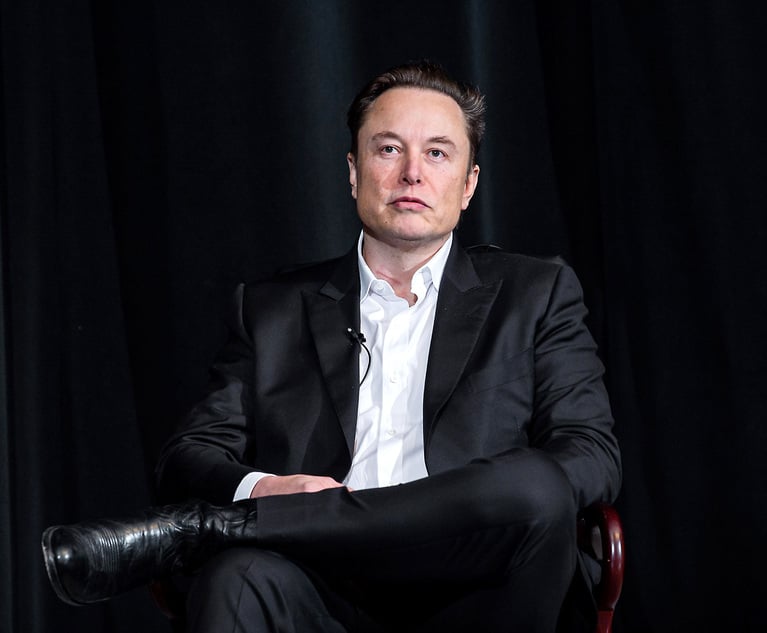When Burford Slowed the Litigation Funding Bandwagon
How fair is the criticism that led to a crash in the firm's share price, and what knock-on effect will it have?
August 16, 2019 at 07:43 AM
5 minute read
It was nice while it lasted. But it's probably safe to say the high-profile dispute between U.K.-listed Burford Capital and U.S. investment firm Muddy Waters Research during the past week has tempered the hype that the litigation funding market has enjoyed in recent years.
Burford has been the poster child of the industry's growth, with its share price rising more than 700% since the start of 2016 up until last month, where it was trading at about 1600p. But following the Muddy Waters report questioning the company's finances, its shares are now levelling out at about half of that.
Whether or not the criticism of Burford – that it is "arguably already insolvent" – will have a knock-on effect on the wider market, partly comes down to how justified it is.
After all, it is easy to be sceptical of Muddy Waters' arguments, given that it holds a short position in the company so will benefit from a fall in the share price. Another short seller, the playfully named Gotham City Research, this week claimed Burford was "inappropriately financed".
In response, Burford issued a fierce rebuttal and hired an elite trio of law firms to advise it.
But some of the accusations do appear fairly hard to dismiss.
For example, Burford's operating expenses of 9% of funds do seem high, especially given that the private equity and hedge fund industries are constantly criticised for having management fees of 2%. Burford largely brushed over this in its response, but one lawyer familiar with the market likened Burford's fee to that of the big investment banks, such as Goldman Sachs and JP Morgan, which can charge about 10% on transactions.
Burford's use of debt to fund investment also sounds worrying when Muddy Waters asserts that the firm's debt and funding commitments "greatly exceed" its $880.3 million adjusted invested capital, putting it at high risk of suffering a "liquidity crunch". Similarly, Gotham City argues that litigation assets "should not be financed with debt", arguing that it poses a real risk of an asset/liability "mismatch nightmare".
To this, Burford offered a terse rebuttal, saying it had a "low debt level" and the capacity to take on more debt "as desired", stating its net debt-to-equity ratio was 0.3x. It is important to note that both sides appear to be talking about slightly different things. Muddy Waters talks about "debt and funding commitments", while Burford talks about "net debt". Perhaps both sides could be accused of cherrypicking their numbers.
Finally, and perhaps most importantly, Muddy Waters described Burford's practice of "consistently" booking non-cash profits when calculating its returns as "unforgivable", while Gotham City said trading at "extreme premiums" on book value is both unsustainable and "foolish".
Burford did not attempt to justify the practice beyond saying it has always been transparent on non-cash recoveries, of which the company has "virtually none", or at any rate less than $1 million "awaiting monetisation". It is not entirely clear if this will prove compelling to prospective investors though.
Regardless of where the truth lies, it is probably fair to say that the litigation funding market will not be allowed to continue its unabashed growth like it did before. Much more scrutiny will now be applied to the numbers of firms, whether or not they employ the same financial tactics of Burford.
It is notable that the debacle sparked other litigation funders into action, with fellow listed-funder LCM distancing itself from Burford's accounting practices. "We are not all the same," it protested.
And yet there is also a broad acceptance that the market is set for further growth, based on the fact that the returns litigation funding provides are uncorrelated with the rest of the market. Investors, particularly hedge funds, love to find assets that will not be affected by stock market, property or bond trends.
It is this, rather than the certainty of strong returns, that has helped draw such large sums of money to the industry, which in turn has led to much of the hype. It does not necessarily matter that returns might not be as good as hoped, the point is they will still arrive even in a market meltdown.
And it is still possible that litigation funding starts to provide big returns to investors too. The unpredictable nature of litigation means there will be dry patches – Muddy Waters says that Burford's returns have so far been driven by just four investments – yet it could also mean there are some investments that prove very lucrative.
Calunius Capital, a litigation funder co-founded by Osborne Clarke senior partner Leslie Perrin, decided at the end of last year to call it a day after several favourable settlements including Rusoro Mining's claim against Venezuela.
So it is not the end of the road for the industry, far from it. But the litigation funding bandwagon has clearly hit a bump in the road and it may find it impossible to gather the same momentum as before.
NOT FOR REPRINT
© 2025 ALM Global, LLC, All Rights Reserved. Request academic re-use from www.copyright.com. All other uses, submit a request to [email protected]. For more information visit Asset & Logo Licensing.
You Might Like
View All
Now That the Trump Era Has Begun, Change Is Coming. For Big Law, Change Is Already Here
6 minute read
The Quiet Revolution: Private Equity’s Calculated Push Into Law Firms
5 minute read
Trending Stories
- 1Charlie Javice Fraud Trial Delayed as Judge Denies Motion to Sever
- 2Holland & Knight Hires Former Davis Wright Tremaine Managing Partner in Seattle
- 3With DEI Rollbacks, Employment Attorneys See Potential for Targeting Corporate Commitment to Equality
- 4Trump Signs Executive Order Creating Strategic Digital Asset Reserve
- 5St. Jude Labs Sued for $14.3M for Allegedly Falling Short of Purchase Expectations
Who Got The Work
J. Brugh Lower of Gibbons has entered an appearance for industrial equipment supplier Devco Corporation in a pending trademark infringement lawsuit. The suit, accusing the defendant of selling knock-off Graco products, was filed Dec. 18 in New Jersey District Court by Rivkin Radler on behalf of Graco Inc. and Graco Minnesota. The case, assigned to U.S. District Judge Zahid N. Quraishi, is 3:24-cv-11294, Graco Inc. et al v. Devco Corporation.
Who Got The Work
Rebecca Maller-Stein and Kent A. Yalowitz of Arnold & Porter Kaye Scholer have entered their appearances for Hanaco Venture Capital and its executives, Lior Prosor and David Frankel, in a pending securities lawsuit. The action, filed on Dec. 24 in New York Southern District Court by Zell, Aron & Co. on behalf of Goldeneye Advisors, accuses the defendants of negligently and fraudulently managing the plaintiff's $1 million investment. The case, assigned to U.S. District Judge Vernon S. Broderick, is 1:24-cv-09918, Goldeneye Advisors, LLC v. Hanaco Venture Capital, Ltd. et al.
Who Got The Work
Attorneys from A&O Shearman has stepped in as defense counsel for Toronto-Dominion Bank and other defendants in a pending securities class action. The suit, filed Dec. 11 in New York Southern District Court by Bleichmar Fonti & Auld, accuses the defendants of concealing the bank's 'pervasive' deficiencies in regards to its compliance with the Bank Secrecy Act and the quality of its anti-money laundering controls. The case, assigned to U.S. District Judge Arun Subramanian, is 1:24-cv-09445, Gonzalez v. The Toronto-Dominion Bank et al.
Who Got The Work
Crown Castle International, a Pennsylvania company providing shared communications infrastructure, has turned to Luke D. Wolf of Gordon Rees Scully Mansukhani to fend off a pending breach-of-contract lawsuit. The court action, filed Nov. 25 in Michigan Eastern District Court by Hooper Hathaway PC on behalf of The Town Residences LLC, accuses Crown Castle of failing to transfer approximately $30,000 in utility payments from T-Mobile in breach of a roof-top lease and assignment agreement. The case, assigned to U.S. District Judge Susan K. Declercq, is 2:24-cv-13131, The Town Residences LLC v. T-Mobile US, Inc. et al.
Who Got The Work
Wilfred P. Coronato and Daniel M. Schwartz of McCarter & English have stepped in as defense counsel to Electrolux Home Products Inc. in a pending product liability lawsuit. The court action, filed Nov. 26 in New York Eastern District Court by Poulos Lopiccolo PC and Nagel Rice LLP on behalf of David Stern, alleges that the defendant's refrigerators’ drawers and shelving repeatedly break and fall apart within months after purchase. The case, assigned to U.S. District Judge Joan M. Azrack, is 2:24-cv-08204, Stern v. Electrolux Home Products, Inc.
Featured Firms
Law Offices of Gary Martin Hays & Associates, P.C.
(470) 294-1674
Law Offices of Mark E. Salomone
(857) 444-6468
Smith & Hassler
(713) 739-1250










